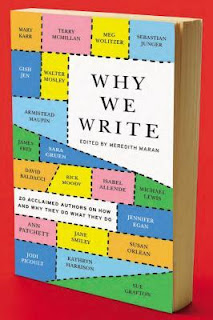20 Acclaimed Authors on How and Why They Do What They Do
Over four decades ago, George Orwell listed the four great motives for writing in his essay “Why I Write”:
1. Sheer egoism. “To be talked about, to be remembered after death, to get your own back on gown-ups in childhood, etc.”
2. Aesthetic enthusiasm. “To take pleasure in the impact of one sound on another, in the firmness of good prose or the rhythm of a good story.”
3. Historical impulse. “The desire to see things as they are, to find out true facts and store them up for the use of posterity.”
4. Political purposes. “The opinion that art should have nothing to do with politics is itself a political attitude.”
Thirty years later, Joan Didion addressed the question, and now Meredith Maran asked twenty household-name authors to write their take on the question of why we write. Some answered the question clearly, cohesively, and obviously with much though. Others claimed they’d never been asked the question before, and let the answers flow.
Most of us know why we write: we’d simply wither and die if we couldn’t. While most of the award-winning authors wax candidly about the WHY, it’s their HOW process of writing and their path to success I found far more interesting.
Isabelle Allende’s tale charmed me with its quirkiness and purity; her dedication to her language and storytelling enchanted me and made me want to pull out one of her books for a lazy reread.
In direct contrast, James Frey’s piece only solidified my dislike of him. It may be just an arrogant facade, but his condescending nature and disrespect for other writer’s AND his audience totally turned me off. He proclaims he’s in the same league as Hemingway, Kerouac, and Miller in one sentence, then boasts how he’s thrilled to make a buck writing crappy scripts under a pen name the plebeians will eat up. His every word drips with condescension.
Kathryn Harrison’s advice seems a direct contrast to Frey: “Don’t portray yourself as who you want to be. Portray yourself as who you are.”
The authors share stories of their depressions and failures as well as their breakthrough experiences (many of which occur at the acclaimed Iowa Writer’s Workshop). All of the authors have reached the level of success where they don’t need a day job, but their anecdotes about their early writing days struck home. My favorite must be Sara Gruen’s description of the closet writing nook she eked out while stuck on Water for Elephants: hidden from her family, emptied of her husband’s clothes, and taped over with old-time circus photos.
Why We Write is a decent book for writers who don’t want to feel alone in their insanity, who know no writer is “normal,” and who seeks some (dis)comfort in the realization that it never gets easy—even for best selling mainstream writers—we just gain discipline and learn how to hide our fears better. For the most part, I enjoyed the variety of writers selected for the project, but I would have loved to have seen some whose careers took off after the publishing industry started its metamorphosis in this last decade. A few less-mainstream writers, like say Christopher Moore or Chuck Wendig could have livened up the candid prose, but at least Maran didn’t include James Patterson.
A portion of the proceeds will benefit 862 National, an innovative youth literacy program.
Why We Write
(release date 1/29/13)
Merideth Maran (editor)
250 pages, $9.99 [Kindle], $10.98 [Paperback]
Plume (January 29, 2013)


Hmm. Interesting. Not sure I need to read the book myself, but I like your savvy summation.
My recent post Overcoming the Blank Page